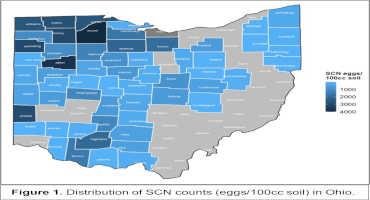
The soybean cyst nematode (SCN) is the most economically important pathogen of soybean in North America and continues to spread throughout Ohio. If SCN levels are above damage threshold, significant yield reduction can often take place without visible symptoms. To know if the nematode is present in a field, soil sample for SCN testing must be properly collected. The presence of SCN in a field, but most importantly, the SCN numbers will determine the best management strategy. Therefore, you need to test your fields to know your SCN numbers.
With funding from the soybean check-off through Ohio Soybean Council and The SCN Coalition, and in collaboration with OSU Extension Educators and growers, we extensively sampled soybean fields in Ohio. From 2018 through 2022, a total of 1,074 soil samples from 60 (of 88) counties in Ohio were submitted for SCN testing (Fig. 1). Soybean cyst nematode is silently gaining territory in Ohio as SCN numbers are rising. The ability to reproduce on soybean cultivars with ‘SCN-resistance’ will limit our ability to protect Ohio soybean production. Active management of SCN begins with an adequate and correct soil sample.
We are excited to continue sampling soybean fields in Ohio to test for SCN with funding from the Ohio Soybean Council and promoting the mission of The SCN Coalition. Our goal is to sample more soybean fields, targeting those that have consistently been yielding low, under continuous soybean or double crop, and with weed issues. We are excited to help with this task by processing up to TWO soil samples, per grower, to be tested for SCN, free of charge.
Source : osu.edu